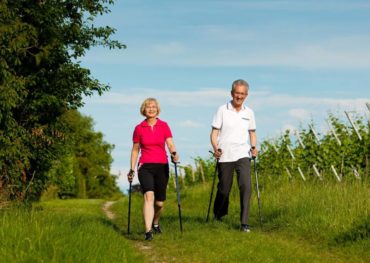 With a fresh new year underway, many of us are making resolutions to begin a healthier lifestyle. If you are a senior, you might want to consider a regular walking routine to improve your overall wellbeing and to put yourself on track for successful aging in the future.
With a fresh new year underway, many of us are making resolutions to begin a healthier lifestyle. If you are a senior, you might want to consider a regular walking routine to improve your overall wellbeing and to put yourself on track for successful aging in the future.
Walking, by nature, is a low-to-moderate exercise. It presents a minimal risk of injury, making it likely the very best form of physical exercise for older persons.
The best part? It is so simple to get started. Just throw on comfortable clothes, some good walking shoes, then open your door and go! No gym fees required.
If you are new to walking, however, you should start out slow. Begin by walking just 10 to 15 minutes at a time, three to five days each week. Slowly work your way up to 30-minute strolls by steadily increasing your walk time each week by five minutes.
Once you have mastered the 30-minute time mark, you can begin increasing your speed or adding in hills to raise the intensity of your workout and enhance your overall health gains.
The wellbeing benefits for older adults who maintain a regular walking routine are numerous:
Improved Cardiovascular Health
Cardiovascular health is likely the single most important benefit for senior walkers. Walking has been linked with lower risks of high blood pressure, high cholesterol, diabetes, heart disease, stroke and cardiac arrest.
Weight Control
Walking burns calories, which can contribute greatly to your efforts to maintain a healthy weight. What’s more, a 15-minute walk has been shown to reduce cravings for sweets, which means regular walking might help you lose some unwanted pounds.
Increased Strength
Walking helps increase muscle strength and bone density. These benefits translate to better balance that lowers your risk of falling.
Decreased Joint Pain
Walking is good for your joints. It can help you maintain flexibility, reduce joint pain and even aid in slowing down cartilage breakdown.
Ramped Up Immune System
Walking fends off illness by helping to boost your immune system. Even when walkers do get sick, they tend to have milder symptoms and recover quicker.
Better Sleep
A good walk is likely to lead to a good night’s sleep. Walking heightens your mood and enhances your overall sense of wellbeing. These benefits pave the way to a general feeling of peace at bedtime that is apt to remain throughout the night.
Hindered Cognitive Decline
Did you know walking can actually slow down age-related memory decline and even the onset of dementia? A recent study of men aged 71 – 93 who walked a quarter-mile or more daily showed half the incidence of Alzheimer’s and dementia.
The benefits of a regular exercise routine is an important part of any person’s plan for a healthier lifestyle. For seniors, it is critical to choose a workout you can stick with as you grow older. Walking, because it is low-intensity and requires little or no “special” gear, may be just the one to lead you on the path to healthful wellbeing and successful aging.























Comments